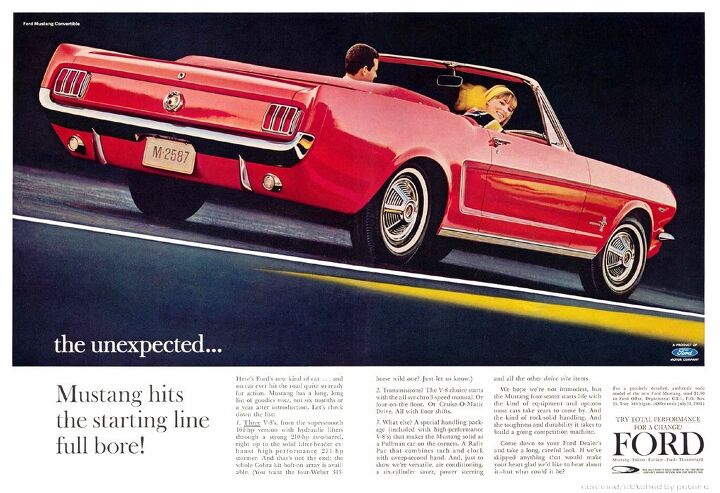Last Whiz Kid Dies at 101: Arjay Miller Served as Ford Motor Company's Seventh President

You don’t reach the ripe old age of 101 without accumulating a few stories, and by all accounts, Arjay Miller had them in spades. The former Ford Motor Company “Whiz Kid,” part of a group of young men hired en masse by Henry Ford II following the Second World War, joined his colleagues in turning around a once-revolutionary automaker that had fallen behind the times.
After achieving this goal, Miller found himself president of the company, only to give up the cushy, high-flying executive existence for the low-paid academic life he seemed to prefer.
Miller, 101, died of a stroke at his Woodside, California home on November 3rd. Stanford University, where Miller served as dean of the Stanford Graduate School of Business for 10 years following his departure from Ford, reported the death on Tuesday.
From his rural upbringing in Nebraska, Miller’s path took him to California, where his education consisted of a bachelor of science degree in finance and banking from the University of California, Los Angeles. This would soon come in handy.
With eyesight too poor for overseas service in World War Two, Miller’s talents led him to the Army Air Force’s office of statistical control — a building full of bright minds able to tabulate data in a world bereft of computers. When the war ended, 10 of those men, Miller among them, grouped together and pitched themselves to prospective employers. Ford Motor Company, newly headed by an inexperienced Henry Ford II (seen above, to the right of Miller), seized the opportunity.
The automaker, once the envy of the world, was losing money year after year. It needed new product, modern sales and accounting practices, and a change in culture. The Whiz Kids, as the men came to be known, spent 15 years doing exactly this. With Henry Ford II at the helm and the 10 former statisticians spread about the company, Dearborn was able to capitalize on the postwar economic boom.
It’s important to note that the Whiz Kids were not given free reign. Early on, senior executives breathed down their necks.
“It was unbelievable,” Miller once said in an interview with Automotive News. “During World War II [Ford] lost money on cost-plus contracts. Now that takes some skill, to lose money on a cost-plus contract.”
Theft by employees was rampant, and the payment practices for both employees and suppliers was horribly outdated — a legacy of the new boss’ grandfather, Henry Ford.
“It was just elementary,” Miller said of the problems the group faced. “It was like shooting fish in a barrel.”
Eventually, one of the group’s members, Robert McNamara, began exerting more influence than the others, spearheading projects like the Ford Falcon compact car and doing away with the ill-conceived Edsel brand. McNamara became company president in 1960, only to leave for a chance to serve as President John F. Kennedy’s Secretary of Defence (a role that brought him much infamy).
Miller took the president’s chair in 1963, serving under CEO Henry Ford II until 1968. In its obituary, The New York Times cites “policy differences” as the reason for Miller selecting a new president. It’s not hard to guess with whom those differences occurred — Miller’s replacement, Semon “Bunkie” Knudsen, was fired the following year by the same man that lured him away from General Motors: Henry Ford II. A rising executive in the Ford ranks — the K-car man himself, Lee Iacocca — took over Knudsen’s job in 1970.
Miller stepped down as vice-chairman of the automaker’s board of directors in 1969 (remaining a member until 1986) and headed to Stanford. He then served as dean of the Stanford Graduate School of Business until 1979.
As the last Whiz Kid, Miller’s death closes a fascinating chapter in the history of the American automotive industry. In their time, the Whiz Kids saw no shortage of scorn from within the industry and their own company, with the design side of the business complaining that data and numbers couldn’t sculpt or sell a beautiful car. Miller said such characterizations — of being perceived as cold and detached — always bothered him.
“We weren’t a bunch of accountants,” Miller told AN. “We knew the importance of people.”
Certainly, in his academic life Miller preached the benefits of ethics and moral responsibility, believing that public policy and business, when combined, could bring about positive social change. The former executive was inducted into the Automotive Hall of Fame in 2006.
In 2014, Miller endowed the Frances and Arjay Miller Fellowship in Social Innovation, recognizing two students each year for their work in social innovation.
[Image: Stanford Graduate School of Business]

More by Steph Willems
Latest Car Reviews
Read moreLatest Product Reviews
Read moreRecent Comments
- Theflyersfan After looking it over, Honda, I want royalties for this one: The Honda Yawn.
- V8fairy Not scared, but I would be reluctant to put my trust in it. The technology is just not quite there yet
- V8fairy Headlights that switch on/off with the ignition - similar to the requirement that Sweden has- lights must run any time the car is on.Definitely knobs and buttons, touchscreens should only be for navigation and phone mirroring and configuration of non essential items like stereo balance/ fade etc>Bagpipes for following too close.A following distance warning system - I'd be happy to see made mandatory. And bagpipes would be a good choice for this, so hard to put up with!ABS probably should be a mandatory requirementI personally would like to have blind spot monitoring, although should absolutely NOT be mandatory. Is there a blind spot monitoring kit that could be rerofitted to a 1980 Cadillac?
- IBx1 A manual transmission
- Bd2 All these inane posts (often referencing Hyundai, Kia) the past week are by "Anal" who has been using my handle, so just ignore them...


































Comments
Join the conversation
Good article, but something's off about the beginning of this paragraph: Miller took the president’s chair in 1963, serving under CEO Henry Ford II until 1968. In its obituary, The New York Times cites “policy differences” as the reason for Miller selecting a new president. Am I the only one confused?
Ed Lundy and Arjay miller were up in line for presidency when Bunkie was let go. Knudsen was one of the kind of guys who would implant people lower down to give him dotted-line data directly to him and bypass management and financing instead of information following chain of command. Knudson also wanted to put the falcon on a body on frame chassis, rather thsn keep it monocoque, due to it being traditional and easier for mudularity, allegedly... but it would have made the car porker, and increased the manufacturing price by $300. Knudson hated Mcnamara and wanted to kill the falcon since it was bob's pet project. Ed Lundy quit because he had enough of Knudson's arsehattery, IIRC.